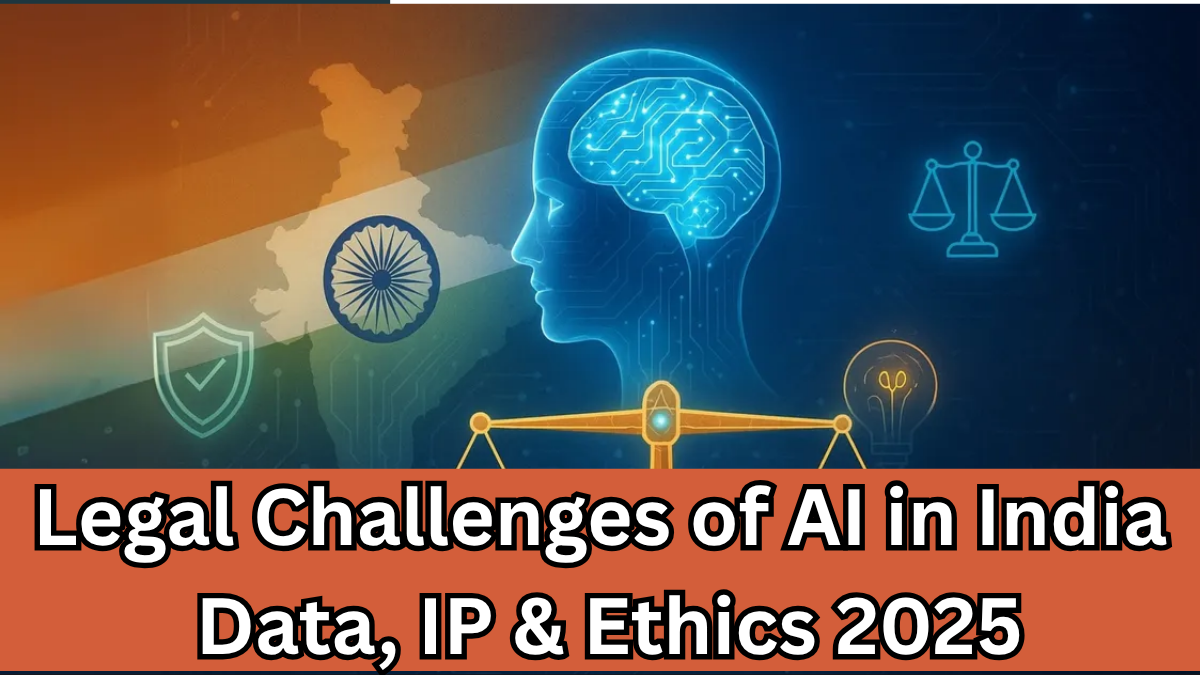Artificial Intelligence (AI) has become a game-changer for businesses, governance, and daily life in India. From chatbots to predictive analytics, AI is everywhere. However, as the use of AI grows, so do the legal and ethical challenges. In 2025, the Legal Aspects of AI in India are under increasing scrutiny, especially concerning data privacy, intellectual property rights, and ethical use.

Why Are Legal Aspects of AI Important in India?
AI systems process massive amounts of data and create outputs that raise questions about ownership, accountability, and compliance. Policymakers and businesses must consider:
-
Who owns AI-generated content?
-
How is sensitive data protected?
-
What ethical standards should AI follow?
These concerns make it crucial to address machine learning & IP issues, privacy laws, and ethical guidelines.
Key Legal Challenges of AI in India
Data Privacy & Protection
AI thrives on data. But with personal data being used for machine learning, privacy breaches are a real threat.
-
Compliance with India’s Digital Personal Data Protection Act (DPDP) is essential.
-
Clear consent mechanisms are required before using personal data.
-
Stricter penalties for data misuse in 2025 demand businesses to be extra cautious.
Intellectual Property & Ownership
When AI creates art, designs, or content, who owns it – the AI, the developer, or the user?
-
The machine learning & IP debate is evolving.
-
AI-generated work currently lacks a clear author under Indian copyright law.
-
Patent applications for AI-created inventions face complex legal reviews.
Ethical AI & Accountability
Ethical considerations go beyond laws:
-
Avoiding bias in algorithms.
-
Ensuring transparency in AI decision-making.
-
Setting accountability when AI systems make errors that affect people’s lives.
Legal Aspects of AI India – A Snapshot
Area |
Key Concerns |
Current Approach |
|---|---|---|
Data Privacy |
Unauthorized data use, consent issues |
DPDP Act compliance |
Intellectual Property |
Ownership of AI-created content |
Under review, evolving case laws |
Ethical AI |
Bias, transparency, accountability |
Industry self-regulation + govt. guidelines |
How Can Businesses Stay Compliant?
For companies using AI in India, staying compliant is non-negotiable.
-
Conduct regular AI audits to check for bias and errors.
-
Update privacy policies to align with new laws.
-
Work with legal experts specializing in Legal Aspects of AI India to navigate complex regulations.
Conclusion
AI is transforming India at lightning speed, but with innovation comes responsibility. In 2025, the focus must be on balancing growth with compliance – protecting data, defining ownership in machine learning & IP, and ensuring ethical AI practices.
FAQs
1. What are the key legal challenges of AI in India?
The major challenges include data privacy concerns, intellectual property rights for AI-generated content, and ethical issues like algorithmic bias and accountability.
2. Does Indian law recognize AI as an author or inventor?
No, as of 2025, Indian law does not recognize AI as a legal author or inventor. Ownership typically rests with the human developer or organization deploying the AI.
3. How does the DPDP Act affect AI development?
The Digital Personal Data Protection Act enforces stricter data handling rules, requiring consent and transparency in AI data usage.
4. What steps can businesses take to address AI ethics?
Businesses can adopt ethical AI frameworks, conduct regular audits, and ensure transparency in their AI-driven decision-making processes.
Click here to learn more
